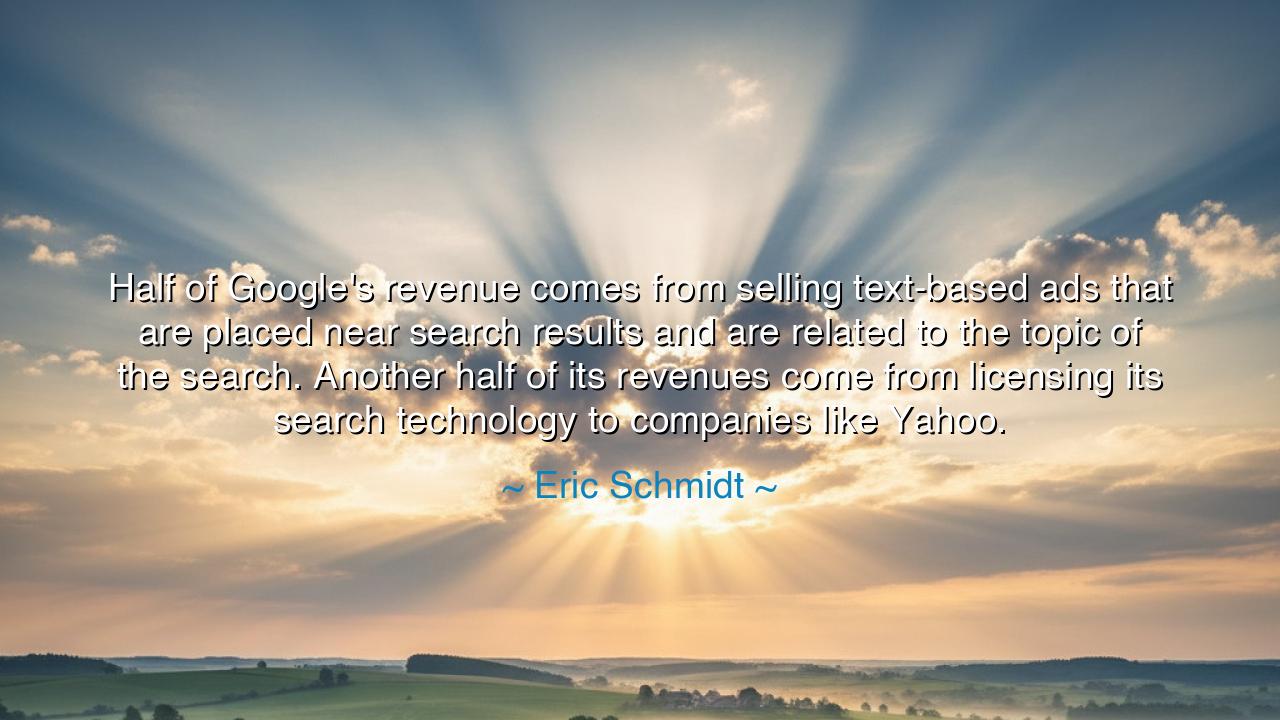
Half of Google's revenue comes from selling text-based ads that
Half of Google's revenue comes from selling text-based ads that are placed near search results and are related to the topic of the search. Another half of its revenues come from licensing its search technology to companies like Yahoo.






Hear the words of Eric Schmidt, once the steward of a rising empire in the digital age: “Half of Google’s revenue comes from selling text-based ads that are placed near search results and are related to the topic of the search. Another half of its revenues come from licensing its search technology to companies like Yahoo.” In these words he unveils the foundation of one of the greatest fortunes of modern times, a revelation that the gold of the new world is not mined from earth or stone, but from words, from information, from the patterns of human curiosity itself.
The heart of this saying lies in the transformation of knowledge into wealth. Once, men grew rich from land, from ships, from oil pulled from the ground. But in the age of the Internet, revenue was drawn from something more subtle: the pairing of questions with answers, of searches with ads. Each keystroke, each query, became a coin; each glance at a page, a link in a chain of fortune. Schmidt speaks not only of business but of a turning point in history, where knowledge itself became the marketplace, and the harvest was taken not from fields but from human attention.
Consider the second half of his truth: the licensing of search technology. Google’s power did not lie only in its own house but in the spread of its engine across the Internet, reaching into the domains of rivals like Yahoo. This was strategy worthy of empire-builders—conquering not by destroying opponents, but by enabling them, profiting from their strength, weaving them into a web where every road led back to Google. In this we see the echoes of Rome, which grew mighty not only by the sword but by roads and laws that bound even conquered lands into its system.
History is filled with such transformations. When Johannes Gutenberg invented the press, the wealth of knowledge multiplied, and those who controlled the presses controlled the flow of thought. When railroads were laid, those who mastered steel and coal ruled the economies of nations. In the same way, Google, by mastering the art of search and monetizing it through ads and partnerships, became the new gatekeeper of human inquiry. Schmidt’s words reveal the ancient pattern: the power of each age belongs to those who harness its greatest channel of flow.
But there is also warning here. For what is gained through ads and technology may also bind the spirit. If wealth is built on attention, then attention becomes the most precious resource of mankind. And if the eyes and minds of billions are constantly bought and sold, what becomes of the purity of inquiry? What becomes of truth itself when it is placed alongside persuasion? Schmidt, perhaps without intending, uncovers a moral question as old as commerce itself: can wealth built on influence remain untainted?
The lesson for us is this: we must learn to see clearly the forces that shape our world. To know that ads are not mere decorations, but the pillars of fortunes; to know that every search is not only a quest for knowledge, but also a thread in a vast economic web. This awareness gives us power—the power to choose wisely, to guard our attention, and to understand the hidden exchanges in which we take part each day.
Practical counsel is this: do not be naive in the age of technology. Recognize that your gaze, your click, your question is a coin spent. Guard it with care, invest it with intention, and do not allow yourself to be shaped unknowingly by forces that profit from your mind. And if you build in this age, remember Schmidt’s lesson: greatness comes not merely from invention, but from learning how to connect invention with human need, and how to weave prosperity from the invisible currents of daily life.
So let Schmidt’s words be remembered: “Half of Google’s revenue comes from ads, the other half from technology licensed to others.” For in this saying lies the story of how empires are forged in the digital age—not in land or armies, but in the mastery of knowledge, attention, and connection. Let this truth guide you: understand the wealth of your time, and learn to wield it with wisdom, lest it wield you.






AAdministratorAdministrator
Welcome, honored guests. Please leave a comment, we will respond soon